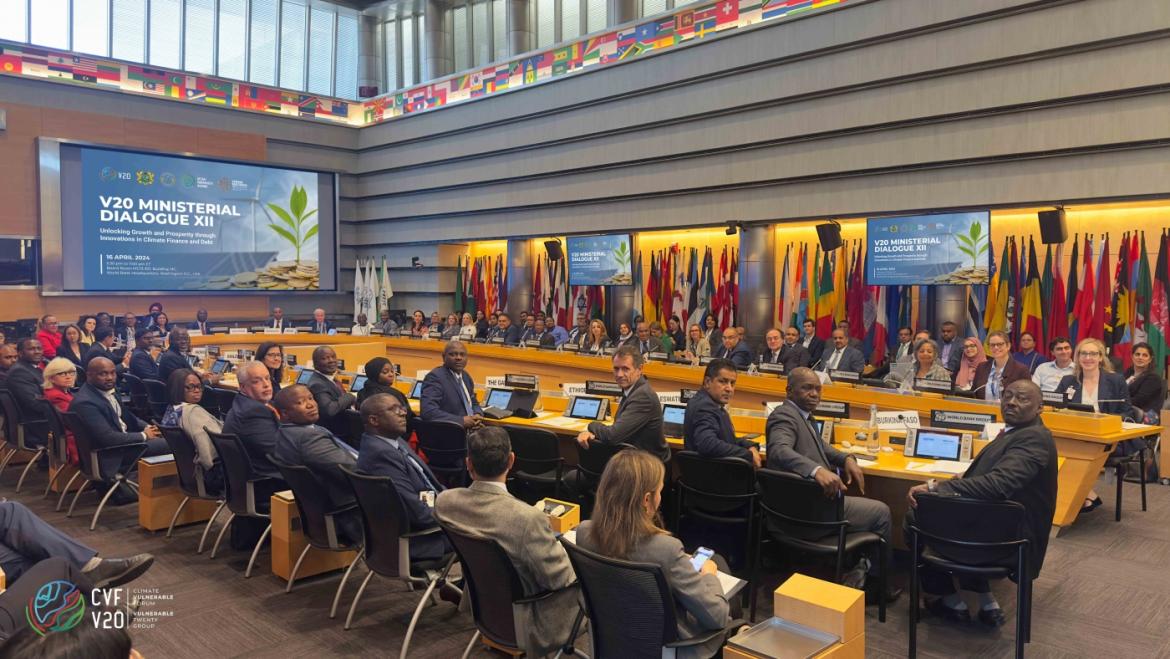World Bank-IMF Spring Meetings 2024

On 16 April 2024, Senior Representatives of the V20 Finance Ministers from the Climate Vulnerable Forum (CVF), representing 68 climate-vulnerable developing countries, during the Spring Meetings of the International Monetary Fund (IMF) and the World Bank Group. In their communique, titled "Unlocking Growth and Prosperity through Innovations in Climate Finance and Debt," called for major reforms of the international financial system to advance innovative financial strategies to drive growth and address the disproportionate impact of climate change on vulnerable developing countries. The group stressed the need to upscale the G7-V20 Global Shield against Climate Risks for more enhanced support to help countries access more financing for recovery from natural disasters and climate shocks.
V20's Call for Global Shield Expansion
The V20 Finance Ministers urged the upscaling of the G7-V20 Global Shield against Climate Risks, emphasizing its potential to reduce the prevailing 98 percent financial and social protection gaps across climate-vulnerable economies. Especially through pre-arranged and trigger-based funds and anticipatory financing for enhanced predictability and risk sharing, particularly through strengthening regional risk pools. The ministers called for the Global Shield and MDBs to prioritize actions defined by the V20 Sustainable Insurance Facility (SIF) to empower micro, small, and medium-sized enterprises (MSMEs) through the development of replicable, template-based solutions for proven business models in MSME climate risk insurance, encouraging the local industry to trust them as viable businesses and supporting them through blended financing as needed to lower cost barriers for demand-side implementation of small unit premium programs.
To promote increased access to concessional finance for climate-vulnerable developing countries, and the establishment of grant windows for adaptation and resilience. They called on the international financial community, including credit rating agencies and the reinsurance industry, to avoid imposing unfair risk premiums and to provide more comprehensive and accurate valuations of economies. Among other recommendations, the group seeks enhancement for major reforms of the international financial system to allow developing countries to access the finances needed for them to meet their ambitious climate goals in particular concessional capital and debt solutions.
Driving Change: GIIF’s Commitment to the Global Shield Facility
In line with the Global Shield’s objective to assist vulnerable countries by increasing access to financial protection against climate shocks, disasters, and crises, GIIF prioritizes project alignment and collaborations to support this goal. In partnership with the Global Shield and donor countries, we prioritize climate risk protection and food security through tailor-made product development using advanced spatial technologies, enhancing customer acquisition and management via digital services, fostering knowledge sharing with local businesses and educational institutions, and expanding strategic partnerships. A special emphasis is placed on supporting women as either beneficiaries or agents of change and our recent initiative with the Federation of African National Insurance Companies (FANAF) and the IFC Women's Insurance Program (WIP) highlighted this initiative. This project seeks to enhance gender diversity and equality within the insurance sector across 28 African nations, to influence the design and decision-making for products that address the needs of women farmers. In alignment with the Global Shield goals, several GIIF's initiatives are already operational in Global Shield Pathfinder countries including Senegal, Pakistan, Bangladesh, the Pacific Islands, Malawi, the Philippines, Madagascar, Rwanda, and Ghana focusing on broadening access to climate and disaster risk finance and insurance products in these countries while promoting the development of gender-smart products.
Looking Ahead
GIIF is dedicated to building strong partnerships and will continue to focus on capacity building, policy engagement, and regulatory reform with efforts designed to improve market conditions and increase insurance uptake globally. Our strategy focuses on advancing innovative solutions to improve access to agricultural and inclusive climate risk insurance products, and we remain committed to collaborating with existing IFC initiatives, IDF Working Groups, and other relevant Global Shield working groups to collectively address unprecedented climate challenges. As we look to the future, we are excited to introduce new initiatives that will further our impact in these areas, and we invite our partners and stakeholders to join us in this journey to make a lasting difference.
Please click here to read the rest of the V20 Ministers' CVF Communiqué.
